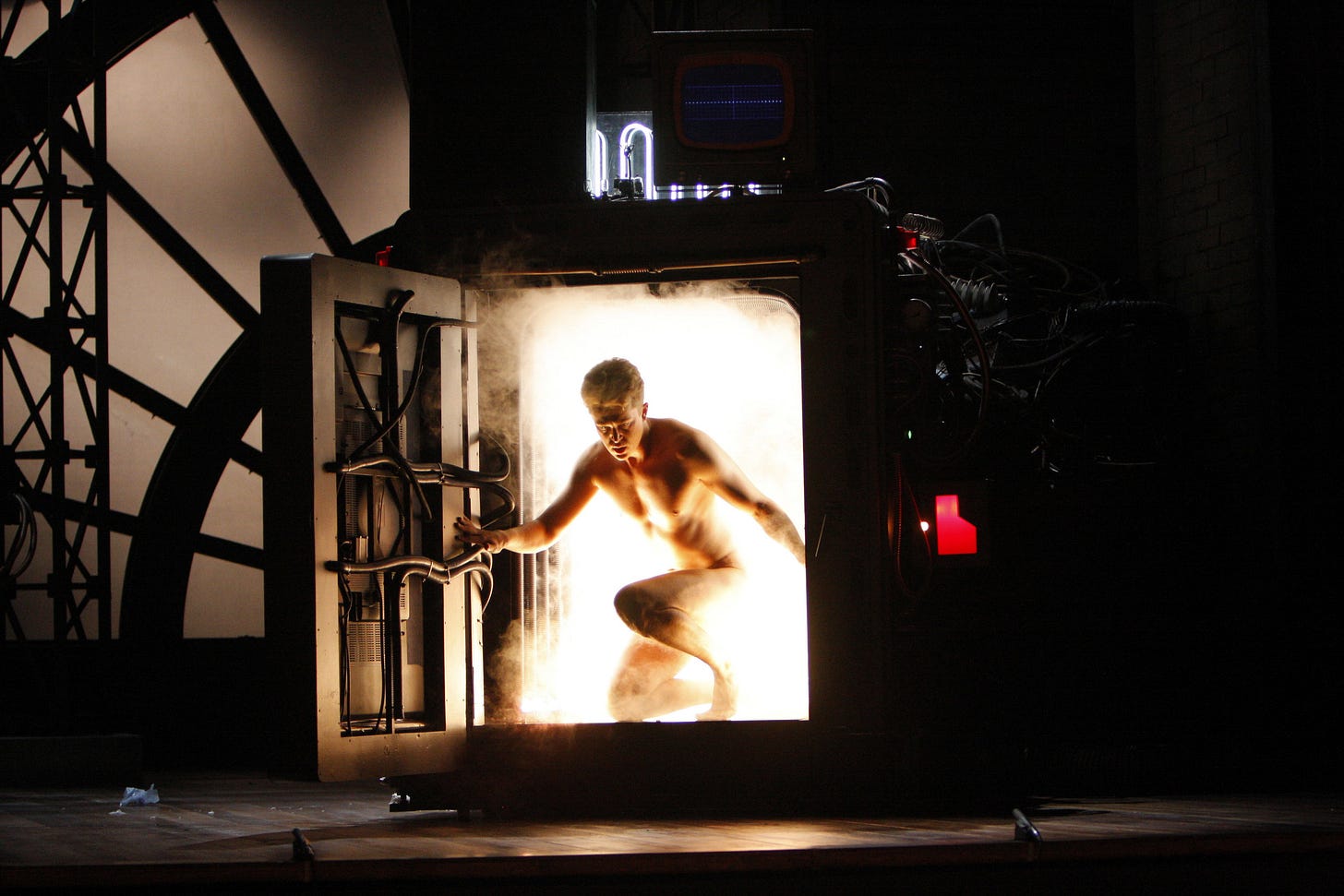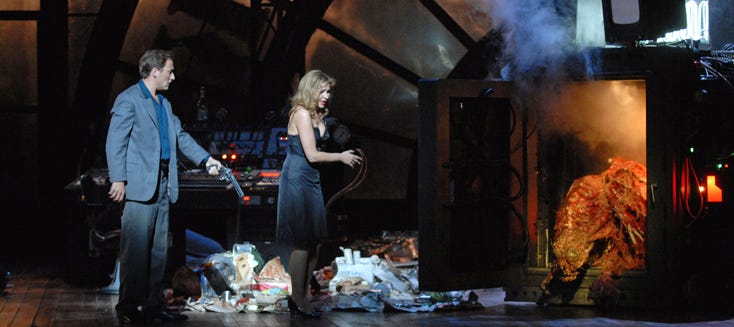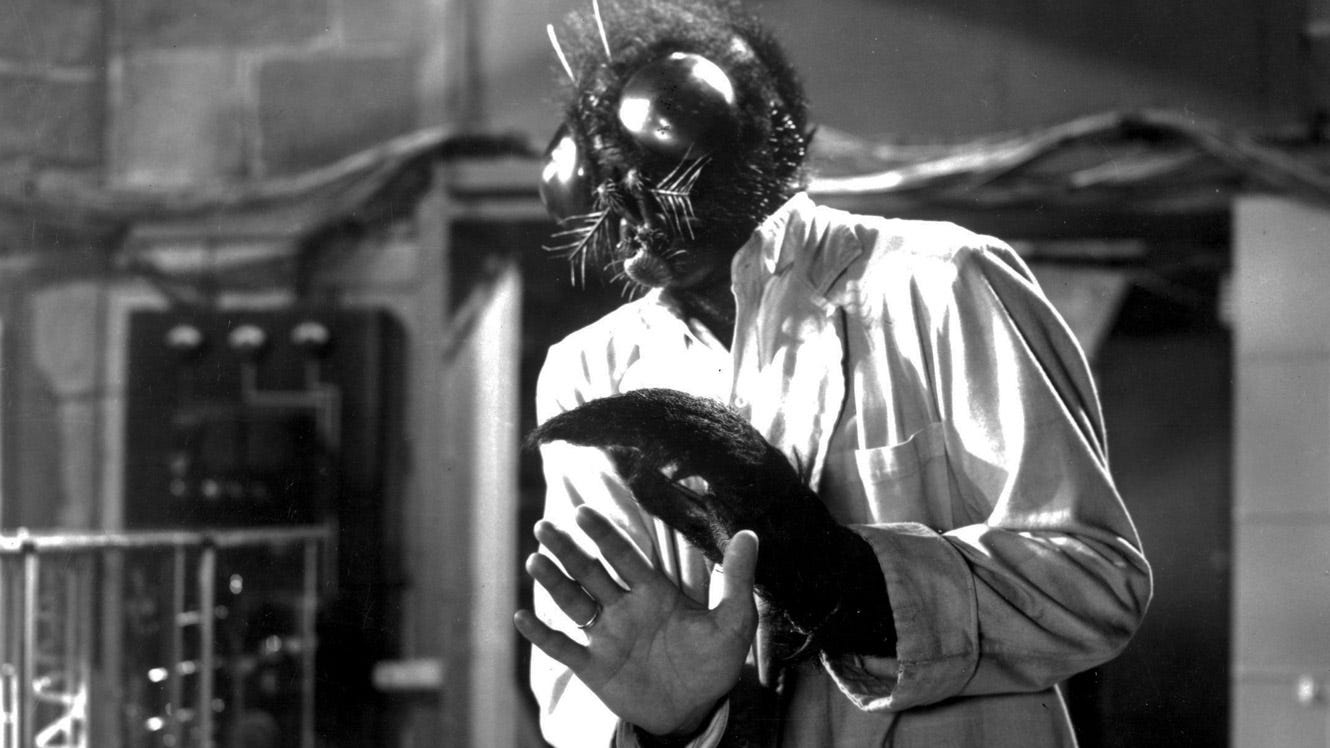Help Me! Setting David Cronenberg's "The Fly" to Music
Horror Moments, Opera Edition
‘Horror Moments’ is a weekly series examining horror-inflected scenes and themes in unexpected places. The ‘moments’ are published weekly on Thursdays, and I share articles on the history of magic, theatre, storytelling, and more on Mondays. Catch up with the recent Kate Bush series here and the full back catalogue of horror moments (from Wallace & Gromit to Shakespeare) here. Don’t forget to subscribe!
You know what would make a great opera? A story about a man turning into a fly. In this week’s final instalment of ‘horror moments, opera edition’ we explore a rare example of a horror film being turned into an opera by the same person who wrote the original soundtrack.
I am talking, of course, about David Cronenberg’s 1986 film The Fly, which was re-written as an opera by composer Howard Shore in 2008.
Shore’s score for the film is brilliant. Like Cronenberg himself, he takes seriously what might have seemed like campy B-movie fare. The 1986 film is a remake of the fun but silly 1958 The Fly which is itself an adaptation of a 1957 short story by George Langelaan (first published in Playboy). It shares the same basic plot: a scientist who had been working on a teleportation device accidentally scrambles his DNA with that of a fly that has crept into the machine unnoticed. The two beings are spliced together with predictably disastrous consequences. It’s a classic sci-fi cautionary fable about messing with things you don’t fully understand.
For Cronenberg, there was something far more subtle going on. King of the ‘body horror,’ that genre so fixated with the horrors that come from within, he saw the story as a doomed romance between two lovers who realise that one of their bodies is beginning to break down and decay. It’s not really about turning into a fly, it’s about the horror of physical metamorphoses brought about by disease. Accordingly, the process of his hero’s transformation is slow and painful. Some of the most moving scenes juxtapose grisly practical effects with heartbreakingly tender lines of dialogue. “I’m scared,” whispers a man whose ear has just fallen off, and like so many people who have tended to the dying, his girlfriend’s love overcomes her disgust and she is instantly in his arms.
Shore’s soundtrack is an appropriately serious piece of music. At times it is triumphant, capturing the thrill of scientific daring, at times it becomes moody and foreboding, it can, occasionally, be tender — but it is always scary.
Having said all that, Cronenberg’s version wasn’t entirely untouched by campness. Because it was the 80s, an obligatory pop song was commissioned called ‘Help Me’ by Bryan Ferry which is honestly pretty decent in its own right but baffling as a companion piece to this bleakly tragic body horror. Kudos to whoever designed the strange looming fly-shaped shadow framing Bryan as he sings in the music video though, that did make me laugh.

‘Help Me’ was originally intended to play over the credits, but was removed. It ended up being heard only briefly in the film as diegetic music playing in the bar during a scene where the hero, newly blessed with fly-strength and fly-libido, challenges someone to an arm-wrestle with bone-breaking consequences. The sudden switch between Ferry’s sultry crooning and Shore’s brilliantly sinister score, literally buzzing with tension, is quite the tonal whiplash but somehow suits the scene. Definitely one you watch through your fingers.
Some of Shore’s most interesting work has come from his collaborations with Cronenberg, a director whose horror films have always brought utterly original plots and perspectives to the screen and have required ground-breaking music. One of my favourites is the strange, poised, coldly mechanical soundtrack to Crash (1996), a film about people with an erotic interest in car accidents, which the Daily Mail and Evening Standard campaigned to have banned in the UK. Shore somehow manages to capture the paradoxically dispassionate passion of the characters, the dissonance of their desires, their apathy for life and yearning for destruction. This from the guy who wrote ‘Concerning Hobbits.’
But given how good his work on The Fly was, could Shore really return to the story and make a compelling piece of music in a completely different form? None of the original score from the film was preserved in the opera, and the whole thing was approached as a separate entity. For a start, a new libretto was provided by David Henry Hwang who had not been involved in the original screenplay. The creature effects, which won designers Chris Walas and Stephan Dupuis an Oscar for Best Makeup Work, had to be completely reimagined for the stage where they would have to perform consistently each night and be worn by a singer. Cronenberg returned to direct, twenty-two years after the release of his film, but he would have to learn a whole new mode of storytelling for the static eye of a live audience.
‘La Mouche,’ as it was called at is Parisian premiere, was given a lukewarm response with blame split fairly evenly: some disliked the direction, some weren’t convinced by the libretto, some just couldn’t connect with the music. On the whole it stood up poorly beside the film, although a few adjustments held the promise of camp originality, like the idea that the teleportation machines and computers themselves can sing (also a necessity given how few characters there are). As Cronenberg said himself, it was a creation of ‘a very different animal’ from the film, but the animal in question was a bit of a ‘Brundlefly’ i.e. a mess.
I do think the set and the creature effects are cool, but Shore seems oddly to have lost a grip on the storytelling. Just look at that arm-wrestling scene towards the end of the preview clip above, it’s got none of the tension of the film’s humming threat, we just get a guy singing beautifully: “That was when my arm snapped in twoooo!” Perhaps they should have thrown in a bit of Bryan Ferry?

At the beginning of this series of horror moments, I asked some of my director and composer friends to tell me their favourite horror operas and a lot of them struggled to think of any. There is a perception that horror and opera don’t go together, but having dug a little deeper I’ve found that that is very much not the case.
From murderous mobs to abandoned lighthouses, from bloody chambers to haunting séances, opera is rich with opportunities for horror. Opera has, in fact, been interested in the horrific for far longer than film has existed as a medium, and tales from horror novels, folklore, history and myth have appeared in opera with just as much relish as they have appeared on screen. The danger in adapting horror stories for this form lies not in the clashing of the two, but in the fact that opera has its own horror language which even the masters of cinema have sometimes failed to learn.
So to conclude, be afraid, be very afraid – but don’t let that stop you singing!
Which horror moments in opera have resonated most with you? Catch up on all ten articles in this series here. Next week we begin a brand new series of horror moments, so stay tuned to find out where we’ll be heading next in our macabre adventures. Until then, happy nightmares everyone!
***P.S. Some of you might remember that earlier this year my own short libretto for a mini-opera ‘The Truth of This’ (based on seventeenth century witch trials) premiered at the Royal Academy of Music. Myself and composer Dawn Erridge have just found out that it has been selected for the Tête-à-Tête opera festival in London this September, so watch this space because I’ll definitely be talking more about that soon.***
Special thanks to all my paid subscribers, who make it possible to keep putting time aside to do all sorts of creative projects and to keep writing Curiosities. x
Horror moments are posted every Thursday and a wide variety of articles exploring the history of magic, theatre, storytelling, and more are published on Mondays.
Remember that you can pay to subscribe for extra benefits or buy me a coffee here to keep me writing. You can also like, share, comment, and recommend to help the substack grow. Thank you!






Thanks for adding yet another layer to The Fly
I’ve started taking Cronenberg more seriously recently just spending more time examining what he’s doing and how he’s getting there. My local library had the DVD of crash which I hadn’t seen for a very long time, and I hadn’t even finished watching it before I ordered a copy for myself because it’s dense.
James Spader‘s performance is just eerily disembodied for something that’s body horror. I was also thinking that Tom Cruise dangling off of the world‘s tallest building probably didn’t take as much artistic courage as what Holly Hunter does in this film. Mr. Cronenberg undertook two notoriously unfilmable pieces of literature, naked lunch and crash, and he delivered on both of them.